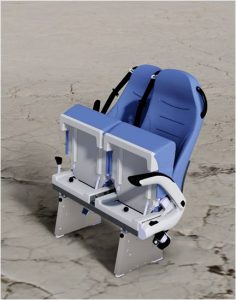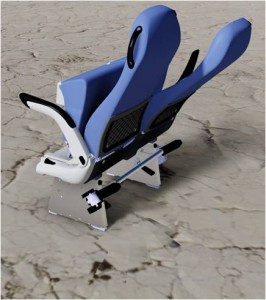
Kiel North America, a seat provider to transit systems around the world, announced recently that the company’s next generation slider model with stainless steel legs has passed testing for the FMVSS 210 safety standards of the National Highway Traffic Safety Administration. The seat even exceeds the stricter requirements mandated from by motor coach supplier Motor Coach Industries (MCI), a leading intercity coach manufacturer in the U.S and Canada. MCI is first to offer the new seat. Since three-point seat belts became legally required in Europe in 1995, Kiel has extended significant parts of its R&D resources to the development of robust seating solutions that absorb enough energy upon impact yet also create a protective survival space. Now, Kiel has fused its affinity for high-tech engineering with a deep commitment for top-quality craftsmanship to develop a next generation slider model for the North American market so wheelchairs can be accommodated more easily in coach buses.
The test protocol of an independent testing facility confirms that the Kiel stainless steel slider seat has met the National Highway Traffic Safety Administration’s requirements of holding a 3,000 pound load for ten seconds. Conforming to the safety standards required by MCI for qualifying suppliers, the seat even withstood a 3,111 pound load for fifteen seconds, and ultimately set a record by holding 3,450 pounds for the same amount of time. The patent for the seat with its self-aligning pedestal system is currently pending.

In addition to setting new industry standards for safety, Kiel has also engineered an extremely durable slider solution that distinguishes itself through its problem-free installation, ease of operation, and low maintenance. The seat’s innovative self-adjusting mechanism compensates for variances in track alignment which makes the installation and operation of the slider extremely simple and time-saving. Highest quality, rust-resistant stainless steel components are designed to withstand corrosion from harshest climates and chemical damage from salt residues, providing a clear advantage to lower-grade materials.
The seat’s foot-operated locking and unlocking system prevents drivers from bending down to manually adjust the system, and also offers ergonomically positioned grab handles at the back. The seat lock is conveniently disengaged by simply lifting up the seat’s cushion while the positioning pin gently guides the seat into the desired position. After foot pedals are used to tightly position the seat, the cushions can simply be flipped back down for a stable lock-down engagement.
“The new design is a great improvement that drivers will appreciate,” said Tom Wagner, MCI vice president of public sector sales.
“We consider ourselves extremely fortunate to be working with some of the most reputable coach builders in North America, and we were eager to take on the challenge of the requirements put forth by Motor Coach Industries,” saidThomas Schwank, general manager of Kiel North America. “With the needs of MCI coach builders in mind for an easy, straightforward installation process and the wish to provide a solution that is equally simple to operate for drivers, Kiel engineers have presented an industry-leading slider seat that sets new standards for the industry.”
